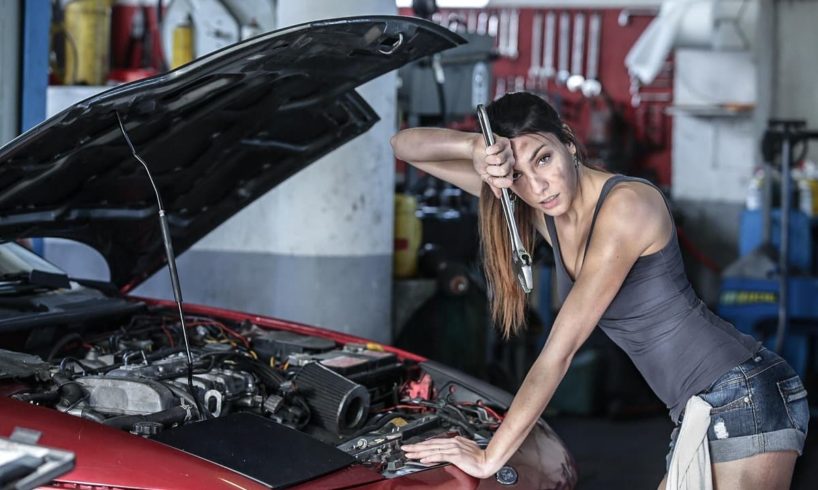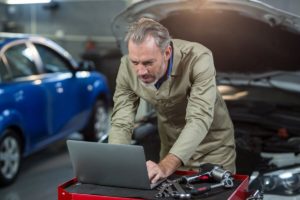
Whether you’re relatively new to the automotive industry or revamping your shop’s safety standards, there’s never a bad time to become more informed about automotive garage safety. An auto mechanic’s shop is home to specialized equipment, flammable gases and liquids, and numerous hazardous chemicals. With all of those hazards present, it’s easy to see why putting off or ignoring safety procedures can have devastating results. However, you don’t have to be fearful—just be careful. Auto shop safety is highly achievable, so long as your culture and practices focus on the right areas. What those areas are, and how to address them, will be our subject in this article.
Maintenance and Cleaning
The simplest things are sometimes the most urgent. Keeping a clean auto shop is just such a task. A cluttered and messy shop doesn’t just look bad to customers—it’s also dangerous. Everyone has their own method for keeping a neat and tidy shop, but a few key areas to focus on include:
- Have a designated home for all tools.
- Make sure everything is returned to its place by the end of the workday.
- Keep a sharp eye out for spills and wet places that can lead to slip-and-fall accidents.
- Have a regular schedule for cleaning and servicing all machinery.
For an easy evaluation of the maintenance state of your shop, try one of the many auto shop maintenance checklists available online.
Must Read: Top 10 Common Car Maintenance Mistakes
Lift Safety
Lifts are one of an auto shop’s most important tools, but they require a strict commitment to safety. The systems differ substantially from each other, but there are some common principles to follow.First, if possible, make sure the lift you’re using is certified by the American Lift Institute. Auto lift certification is voluntary in most jurisdictions, but a lift certified by the ALI means the manufacturer has taken the time to have its product inspected by an industry authority.
Other general tips for lift safety include:
- Every employee should know what the weight limits of your lifts are. Before you even get a vehicle on the lift, make sure the lift’s weight rating is sufficient.
- Employees should check restraint systems every single time they take a vehicle up or down on the lift.
- Loudly and clearly announce “up” and “down” when moving the lift.
- If using a runway ramp-style lift, always ensure that chocks are in place before the vehicle goes up.
- Have your lift regularly inspected by an OSHA-approved inspector and serviced by a qualified professional.
The ALI has more information about lift buying and operational safety. When in doubt, however, consult your lift manufacturer’s guidelines, which should be easily available for anyone who operates your lift.
Fire Safety and Suppression
Auto shops are highly vulnerable to fire, so it’s essential to have well-developed safety procedures and training. You can greatly reduce your shop’s risk of fire by taking the following precautions, among others:
- Placing a sufficient amount of fire extinguishers in your shop in accordance with OSHA rules and testing them regularly
- Ensuring that smoke alarms are functioning by testing them at least once a month
- Storing and using fuel and other flammable products in a well-ventilated area
- Creating and rehearsing a detailed plan for fire emergencies
- Ensuring that used motor oil is regularly disposed of at a used motor oil processing facility rather than kept around or thrown in an unapproved receptacle
One other thing that should be obvious: Smoking and auto shops don’t mix. Some shops have banned it completely. However, if you still allow it on your premises, smoking should never be allowed inside the shop or the lobby. These locations are too close to flammables like fuel and engine oil, and the dangers of secondhand smoke create hazards for employees and customers.
Also See: 7 Signs Your Wheels Need Replacing
Chemical Safety
Hazardous chemicals are a fact of life in any auto shop, but it’s easy to greatly reduce the danger through relatively simple safety procedures. Knowledge is the first step. OSHA Right to Know laws require employers to keep easily accessible information on all hazardous chemicals they work with. Make sure you have this information and keep it updated. More important than knowledge, though, is practice.
Appropriate personal protective equipment is another vital area of attention for chemical safety. Body shops, for instance, will need to provide their employees with masks when doing paintwork. When incidents do occur, having the appropriate resources to deal with them makes all the difference. Eyewash and chemical burn treatment kits are particularly necessary.
Where possible, it’s also worth it to make the switch to greener versions of the products you already use. For example, 3M now offers versions of its popular spray adhesives that are lower in Volatile Organic Compounds (VOC). These more environmentally friendly spray adhesives still offer the performance you expect, but with a cleaner and greener formula.
Creating a Culture of Care
Achieving employee compliance is a good start for a safety policy, but it’s not enough. To have a truly safe auto shop, you need to guide your culture in that direction. You want a culture where safety is more than a set of rules; it’s a duty for employees to look out for one another and for customers. It’s vital for management to lead by example, here, because this “culture of care” starts at the top. It can’t be bought; it must be grown through relationships of mutual respect. Behaviors that create a culture of care can include:
- Not asking employees to work when sick or overly tired
- Spending adequate time on safety training
- Ensuring personal protective and safety equipment is up-to-date and functioning properly
- Using empathetic responses to encourage honesty and question-asking
These rules aren’t about a punitive or fear-based approach to safety. Like all these focus areas, they’re about creating an environment in which your business can thrive.
Whether it’s fire, chemicals, lifts, or anything else, safety is the foundation that supports all the other great things that can happen in an auto shop. When you commit to safety, your employees will too. That’s a move that truly benefits everyone.







